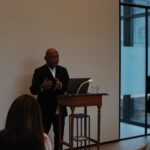

Amplifying Refugee Voices, an event organized by Kristina and the Academy team for World Refugee Day 2025.
Is there anyone left in Europe who hasn’t heard about the “ongoing migration crisis”? If we go by recent headlines in national and international Western media, it seems like people are scared, worried, anxious, threatened, sad, confused – or even angry – at the thought of “upcoming migrants coming to change the world.” Statements like “soon enough, migrants will outnumber the local population” have become not just common but widely believed across Europe.
But when we let the numbers do the talking, the story shifts. Even in Germany – the country with the highest number of refugees in Europe – refugees make up just 2.5% of the total population (IOM, 2022). And yet, we’re told this is a crisis. So, I can’t help but ask myself (and the people I’ve heard share these fears): What exactly defines a crisis? Why is this one so alarming? What has really changed in Europe—and is it because X number of refugees arrived? Where are all these crimes that supposedly flood the news? And above all, who actually benefits from making migrants seem so damn dangerous?
As a former migration student, I was taught to question every statement I saw in the news – even the ones that seemed harmless. Yet, when one of my Master’s professors, Hein de Haas, asked our class of twelve whether we believed there was a migration crisis in Europe, we all struggled to articulate why there wasn’t.
That’s when he introduced us to the migration paradox. Between 2012 and 2024, the EU border agency Frontex saw its budget skyrocket from €85 million to €922 million (Statista Research Department, 2024), reflecting an ever-growing focus on border control. This massive increase highlights a deeper contradiction: Western governments face a constant balancing act when it comes to migration. On one hand, they need migrant workers to fill job shortages and keep their economies running. At the same time, they have a responsibility to protect the rights of those who arrive. But they also feel pressure from citizens who want stricter immigration controls. This tension creates a paradox where governments rely on migration while also trying to limit it.
Despite the media frenzy surrounding migration, global migration levels have remained remarkably stable over the years. So, if the numbers don’t justify the panic, what exactly makes this a crisis?
Migration has become one of the most politically charged topics in Western countries. This constant balancing act turns migration into a political battleground, where parties use it to gain votes – some fueling fears about an ‘invasion,’ while others argue for more humane policies. The result? Migration is less about facts and more about how politicians frame the debate.
We see the politicization of migration being used as a powerful tool by right-wing leaders like Hungarian Prime Minister Viktor Orbán, who has built his entire political brand around anti-immigration rhetoric, or U.S. President Donald Trump, who gained massive support through promises to crack down on immigration.
On the other hand, political groups like The Greens have shaped a significant part of their manifestos around dismantling harsh border policies, such as the militarization of Frontex.
Yet, migration remains one of the most effective tools for political polarization – when society is split into two opposing camps with shared internal values, politicians capitalize on this divide. By reinforcing their supporters’ beliefs, and solving the “crisis”, they not only mobilize their base but also secure votes, turning migration from a policy issue into a political combat zone.
In the realm of our democracy, the political front takes precedence over the actual truth. Migration has always been a natural human behavior, occurring across the world for centuries. However, when irrationalized, it can be turned into a dangerously sharp weapon.
At the end of the day, it is not politicians who will face the consequences of their campaigns. It is not they who will be denied legal asylum when fleeing conflict, nor will they be the ones facing discrimination on the streets. They will simply continue to govern a democratic nation—untouched by the very realities they manipulate.
The words of this article have come to an end – just like the limited actions I can take on the matter. Crisis, polarization, immigration, refugees – these words flood every newspaper, every headline on the street. But no matter how often they appear, people must keep their critical mind sharp and ask themselves the simplest yet most important questions: Why this phrase? Why this word? And why today? … I think, therefore I am.

Kristina Ivancheva
This article was written by Kristina Ivancheva and edited by Alaïa Lafleur.